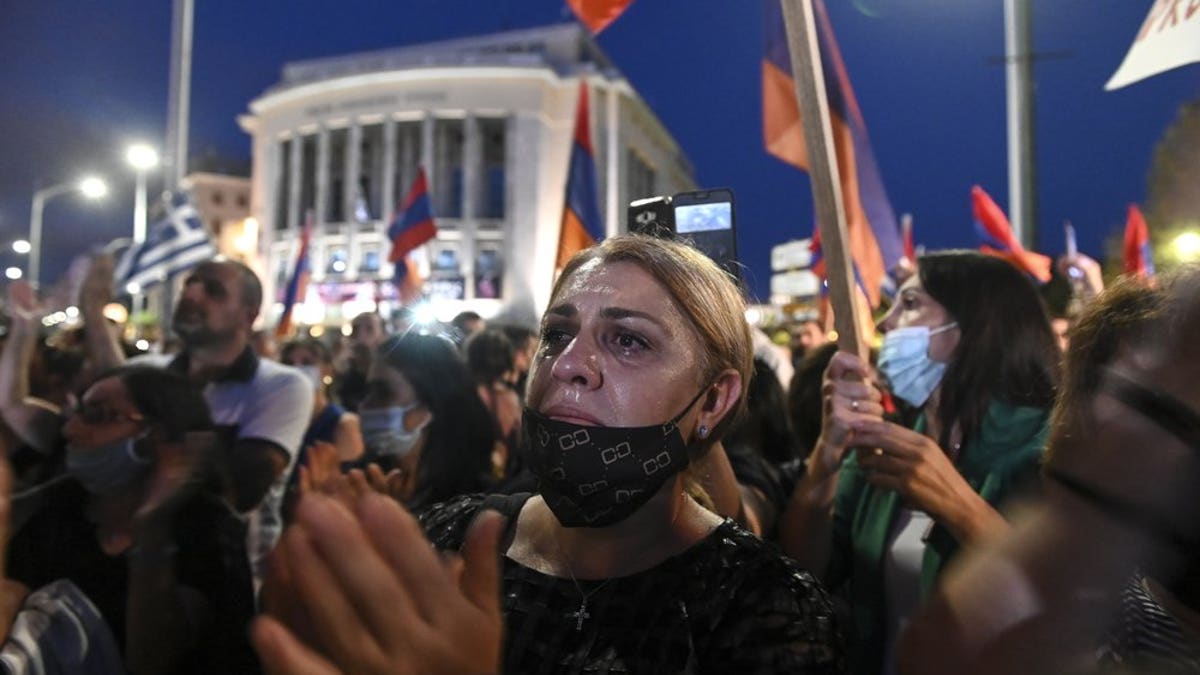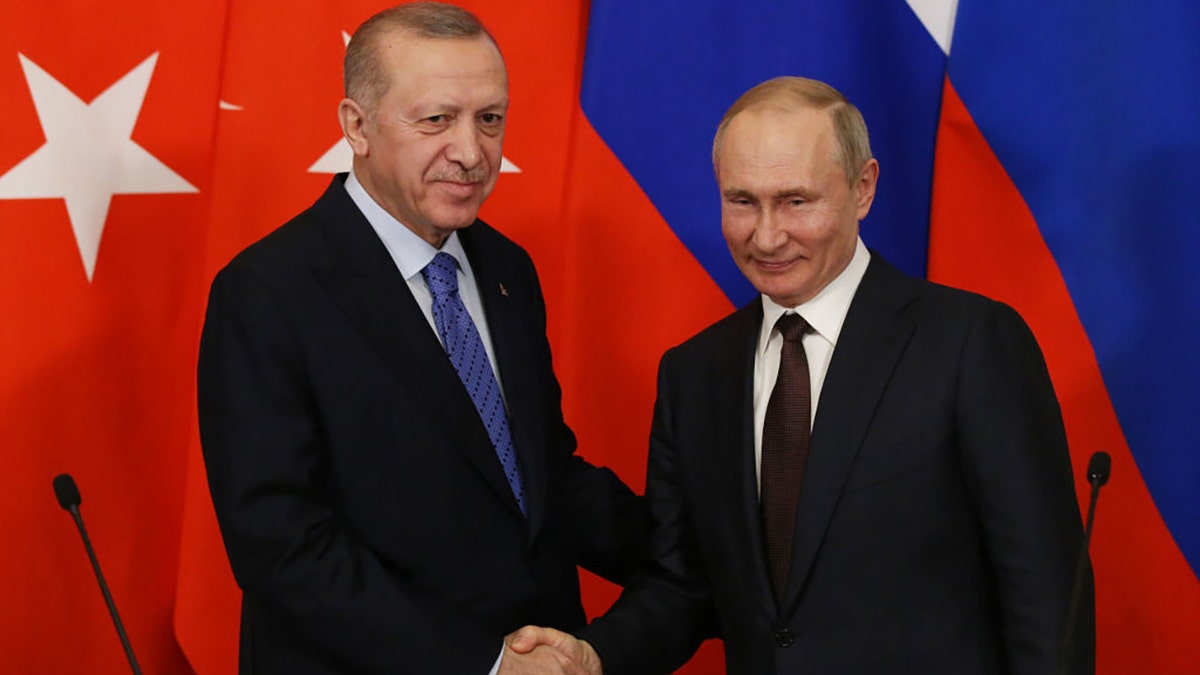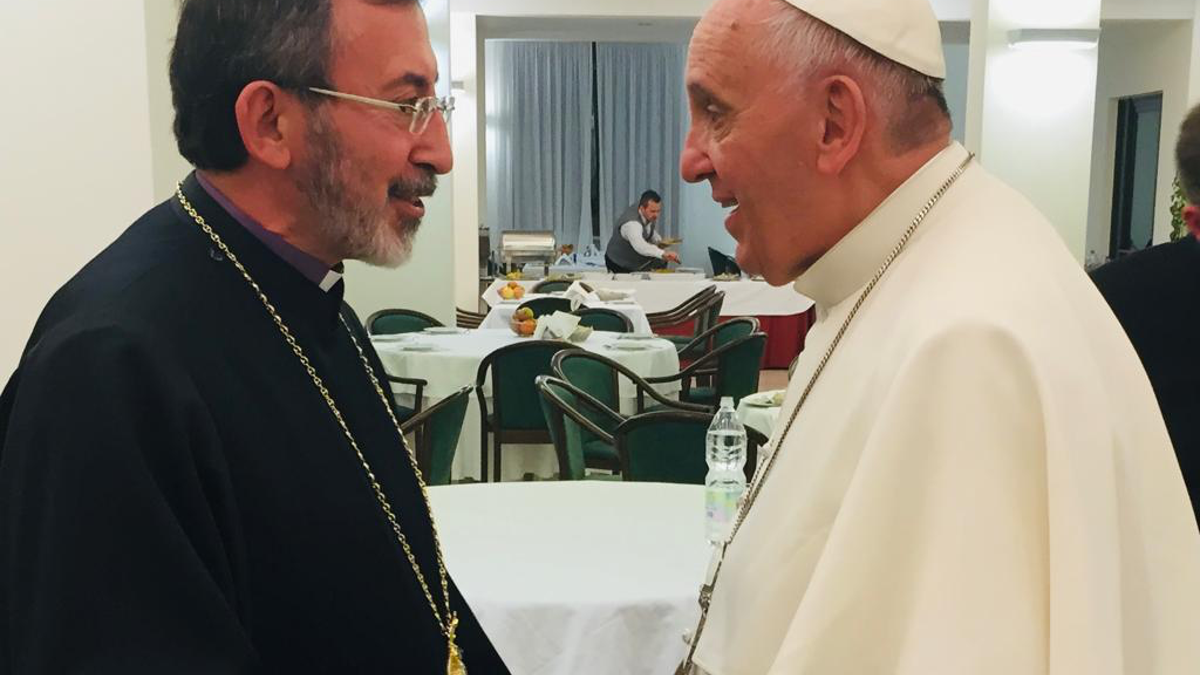Images show Russian military buildup near Ukraine
Lt. General Ben Hodges on Russian military reportedly building military near Ukraine.
The nation of Armenia continues to face "setbacks" one year after a war with Azerbaijan left it vulnerable to advances from Turkey that could reshape the power balance in the region.
Why does it matter?
Armenia once boasted an empire that touched the Mediterranean, Caspian and Black Seas; now, its country is about the same size as the US state of Maine. Often cited as the world’s first Christian nation, Armenia has faced constantly shrinking borders over the past centuries, surviving the changeover of empires and World Wars.
The walls are closing in around Armenia, and the mood within the country is one of tension and fear, former Armenian Ambassador to the United States Grigor Hovhannissian told Fox News.

Protesters take part in a demonstration in support of Armenia, in the northern city of Thessaloniki, Greece, Saturday, Oct. 3, 2020. Heavy fighting between Armenia and Azerbaijan continued Saturday in their conflict over the separatist territory of Nagorno-Karabakh, while Azerbaijan's president criticized the international mediators who have tried for decades to resolve the dispute. (AP Photo/Giannis Papanikos)
Hovhannissian noted that Armenia’s traditional ally, Russia, has kept a calm hand during the more recent troubles, and Iran remains at a distance as a way of helping maintain stability in the region, but each power is paying close attention to how the situation develops.
Last year, Armenia faced a new war, this time against Azerbaijan – a Muslim neighbor to the east. The 2020 Nagorno-Karabakh War – also known as the Forty-Four Day War – killed 6,600 people and ended with an armistice signed along with Russian President Vladimir Putin, who personally intervened and guided the negotiations.
UKRAINE SAYS RUSSIA AMASSED 100K TROOPS NEAR BORDER, BLINKEN RAISES ‘REAL CONCERNS’ OF INVASION
The deal left Armenia vulnerable to the political ambitions of long time adversary (and U.S. ally) Turkey, who now seeks to use Armenia as land access to trade with Azerbaijan. That access also provides Turkey a stronger foothold in the Caucuses, bordering Iran and just a little south of Russia. The fate of Armenia could spell the future of a region between three nations of vital importance to U.S. interests in the region.
"I think we’re back to square one in the sense that what started as a conflict between self-determination of the Karabakh Armenians and the territorial integrity of Azerbaijan…30 years later, this conflict has not been resolved, even despite the war, even despite Azerbaijan saying there is no longer Karabakh conflict," Hratch Tchilingirian, a scholar and activist, told Fox News.

MOSCOW, RUSSIA - MARCH 05: Russian President Vladimir Putin and Turkish President Recep Tayyip Erdogan shake hands during their talks at the Kremlin on March 5, 2020 in Moscow, Russia. Erdogan is having a one day visit to Russia to discuss the war conflcit in Syria. (Photo by Mikhail Svetlov/Getty Images)
The Armenians emerged from the Soviet Union in the 1990s, its country and economy in shambles following a devastating earthquake. The following decades presented a long road to an independent, democratic society.
Tchilingirian described the situation as "complicated" because Western allies have kept a hands-off approach to the region, which has allowed Turkey to act with impunity. In the past, Christian nations – such as Britain, France and Russia – would justify action against the Ottoman Empire by pointing to the treatment of Armenians by the empire.
President Biden took a historic step when he entered office by formally recognizing the Armenian Genocide - a move that previous presidents avoided over fears of angering Turkey, who adamantly denies committing any atrocities during World War I. Turkish President Recep Tayyip Erdogan responded angrily to Biden's decision, calling it "political opportunism" and saying: "We entirely reject this statement based solely on populism."
Tensions between the U.S. and Turkey have continued to grow more strained, with Turkey last month banning the U.S. Ambassador for demanding the release of businessman and philanthropist Osman Kavala from prison.
TURKEY'S PRESIDENT BANS US AMBASSADOR, 9 OTHERS AS ‘PERSONA NON GRATA’
Biden's support of Armenia itself, though, has been far more removed and muted as Erdogan pursues what Hovhannissian called "Ottoman ambitions" in the region.
"The price is not that high for his allies," Tchilingirian argued. "[Erdogan] can do what he wants."

(Courtesy AGBU)
An ongoing issue in the aftermath of the conflict centers on a number of Armenian detainees and Prisoners of War (POW) who remain in Azeri custody despite an agreement to free all such individuals from both sides. The Armenian government lodged an official case at The Hague over the matter in September.
Azerbaijan also has allegedly deployed a similar land-grab tactic that Russia has used against Georgia, which sees the country make slow and incremental gains that are difficult to track and hard to dispute on a case-by-case basis.
OFFICIALS TELL AP THAT IRAN SEIZED VIETNAMESE OIL TANKER
Archbishop Khajag Barsamian told Fox News that the Armenian people have had a "difficult time," but he points to many times in the past that the Armenian people have rebounded following "setbacks."
"Armenians, in spite of the challenges … they know how to survive, how to revive," he said. "Revival has been a great experience for the Armenian people, because of their profound faith and outlook for the future."
"Armenians have faced these kinds of challenges, but with determination, their faith and a positive attitude, they were able to overcome and move forward."
Armenia needs to focus on rebuilding the economy and avoid fighting as much as it can, Barsamian said, and be wary of the regional politics by which Armenia finds itself constantly surrounded.
CLICK HERE TO GET THE FOX NEWS APP
Armenia grabbed headlines in 2018 after Nikol Pashinian, head of the Civil Contract party, made a peaceful march on parliament and successfully removed Prime Minister Serzh Sargsyan from his post, having taken the post after serving for a decade as president in a move seen as a gross power grab. The country projected a sense of optimism about its path.
The war has stopped that process – not that the country is less democratic, but the priorities have changed to focus on engaging the Western allies to help Armenia maintain its state and reach more peaceful discussions and a level of trust with its neighboring allies.









































